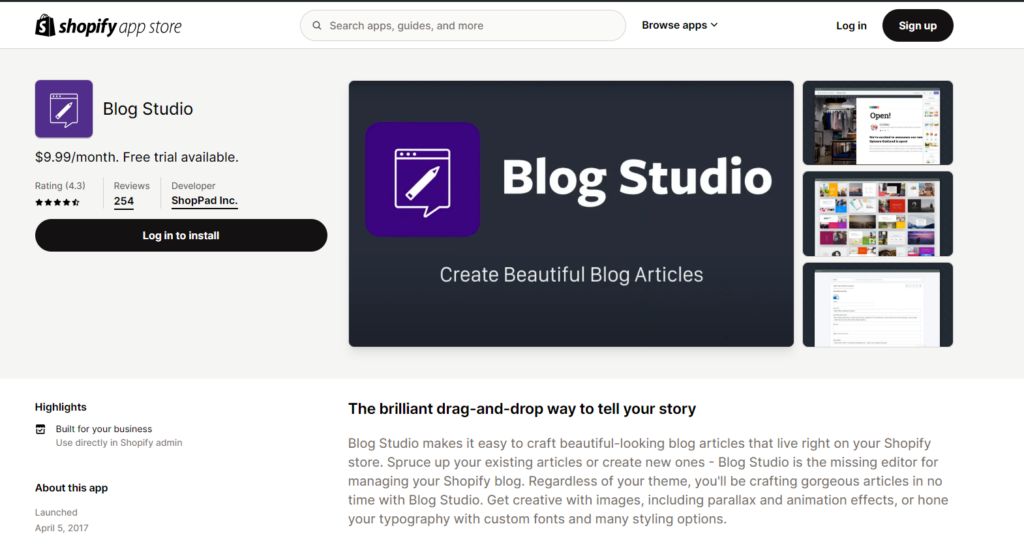Are you an online retailer in the UK looking to start a blog to boost your e-commerce business?
Or maybe you’re a blogger interested in adding an online store to your site?
Either way, you’ll need to choose the right blogging platform that offers the features and functionality you need to succeed.
In this blog post, we’ll explore the seven best blogging platforms for e-commerce in the UK, helping you decide which one is the best fit for your business.
When it comes to choosing the best blogging platform for your e-commerce business in the UK, there are several factors to consider.
You’ll want a platform that offers flexibility, scalability, and features that support both your blog and online store.
In this blog post, we’ll take a look at the seven best blogging platforms for e-commerce, discussing the features, pricing, and ease of use of each option.
By the end, you should have a clear idea of which platform is the perfect fit for your UK-based e-commerce business.
What is a Blogging Platform?

A blogging platform is a software or service that allows you to create, publish, and manage a blog on the web.
It provides the tools and features needed to write and format blog posts, add images and videos, and engage with your audience through comments and social sharing.
Blogging platforms also typically offer a variety of design templates and customization options to help you create a unique and engaging blog website.
When choosing a blogging platform, it’s important to consider your specific needs and requirements.
For e-commerce businesses in the UK, it’s crucial to select a platform that not only offers a smooth blogging experience but also integrates well with your online store and helps you reach your target audience.
The 7 Best Blogging Platforms for E-commerce in the UK
1. WordPress

WordPress is a popular and versatile blogging platform that powers millions of websites worldwide. It offers a free, open-source content management system (CMS) that can be used to create a wide variety of websites, including e-commerce stores.
WordPress is highly customizable, with thousands of themes and plugins available to extend the functionality of your blog.
You can easily find themes specifically designed for e-commerce, and there are numerous plugins that add shopping cart functionality, payment gateways, and product management features.
While WordPress does have a bit of a learning curve, especially for those new to blogging or website building, there are plenty of resources and support available online. Once you get the hang of it, WordPress offers a lot of flexibility and control over your blog and e-commerce store.
For UK-based e-commerce businesses, WordPress is a great choice as it allows you to create a fully customized and feature-rich blog and online store. You can choose from a wide range of hosting providers, many of which are based in the UK, ensuring fast loading times and reliable performance for your customers.
2. Shopify

Shopify is a leading e-commerce platform that also happens to be a fantastic blogging platform. It offers a user-friendly interface and a wide range of features specifically designed for online stores. With Shopify, you can easily add a blog to your e-commerce website and start creating engaging content to attract and retain customers.
One of the biggest advantages of Shopify is its simplicity and ease of use. Even if you have no technical expertise, you can quickly set up a professional-looking blog and online store.
Shopify provides a selection of sleek and responsive themes, many of which are optimized for blogging, and offers a user-friendly content editor that makes writing and formatting blog posts a breeze.
Shopify also offers excellent scalability, allowing you to start small and grow your business over time.
With plans to suit different needs and budgets, you can choose the option that best suits your e-commerce business, and upgrade as your requirements change.
For UK users, Shopify offers local payment gateways and provides 24/7 support, making it a convenient and reliable choice.
3. Wix

Wix is another popular website builder and blogging platform that is well-suited to e-commerce businesses in the UK.
With Wix, you can create a stunning blog and online store using their intuitive drag-and-drop editor, which makes it easy to design a unique and engaging website.
One of the standout features of Wix is its artificial design intelligence (ADI) tool.
This tool asks you a series of questions about your business and then automatically generates a customized website for you, complete with a blog and online store.
You can then easily customize the design and add your own content to suit your brand and products.
Wix offers a wide range of e-commerce features, including secure online payments, product galleries, and subscription services.
They also provide a variety of apps that can be added to your site to extend its functionality, such as live chat, email marketing, and social media integrations.
For UK users, Wix offers local payment options and provides customer support during UK business hours.
4. Weebly

Weebly is a user-friendly website builder and blogging platform that is particularly well-suited to small businesses and startups. It offers a simple and intuitive drag-and-drop interface that makes creating a blog and online store quick and easy.
Weebly provides a range of responsive themes, many of which are designed with blogging in mind, ensuring your website looks great on all devices. They also offer a variety of e-commerce features, including secure checkout, inventory management, and shipping options, making it easy to sell physical and digital products online.
One of the benefits of using Weebly is that it offers a free plan, which is ideal for those just starting out. This plan includes basic e-commerce functionality, allowing you to list up to five products and process payments through Square.
For more advanced features and higher product limits, you can upgrade to one of their paid plans, which are still very affordable compared to other platforms. Weebly also provides local payment options and customer support for UK users.
5. Squarespace

Squarespace is a website builder known for its beautiful, modern designs and powerful features. It is an excellent choice for e-commerce businesses in the UK that want to create a stylish and professional blog and online store.
Squarespace offers a wide range of templates specifically designed for blogging, with a focus on showcasing your content in an engaging and visually appealing way. Their content editor is user-friendly and provides a range of formatting options, allowing you to create blog posts that truly stand out.
In terms of e-commerce features, Squarespace offers everything you need to run a successful online store. You can easily manage your products, inventory, and orders, and take advantage of features such as abandoned cart recovery and customer account creation.
Squarespace also provides robust analytics and SEO tools, helping you to optimize your blog and store for search engines and track your website’s performance. Squarespace offers local payment gateways for UK users and provides 24/7 email and live chat support.
6. Medium

Medium is a unique blogging platform that has gained popularity in recent years.
Unlike other platforms, Medium is not a traditional website builder, but rather a publishing platform and social media community.
It offers a simple and clean interface for writing and publishing blog posts, and allows you to connect with other users and discover new content.
While Medium may not be the first choice for e-commerce businesses in the uk, it can be a useful additional platform to reach a wider audience.
You can easily import your existing blog posts from other platforms, and take advantage of Medium’s built-in audience to gain more exposure for your content.
Medium also offers a partner program that allows you to monetize your content through membership fees, providing an additional revenue stream.
For UK-based e-commerce businesses, using Medium in conjunction with your main blog and online store can be a great way to increase your reach and build a following.
You can share your expertise, showcase your products, and drive traffic back to your website, all while taking advantage of Medium’s built-in community and discovery features.
7. Blogger

Blogger is a free blogging platform owned by Google.
It is one of the oldest blogging platforms and, while it may not be as feature-rich as some of the other options on this list, it is still a solid choice for those looking for a simple and free way to start a blog.
With Blogger, you can create a basic blog with customizable templates, and easily integrate Google features such as AdSense for monetization and Analytics for tracking your blog’s performance.
It also offers seamless integration with other Google products, making it easy to manage your blog and other online tools in one place.
While Blogger may not have the same e-commerce capabilities as the other platforms, it can be a good choice for those who want to start a simple blog and gradually add more features over time.
There are third-party widgets and tools available that can add some e-commerce functionality to your Blogger site, or you can embed links to external online stores.
For those just starting out, Blogger’s simplicity and ease of use make it a worthwhile option to consider.
How Get Started With Blogging as an eCommerce Business in the UK

Now that we both agree that blogging can be a powerful tool for eCommerce businesses in the UK, how can you get started?
Step 1: Choose Your Niche:
What are your products or services?
Who is your target audience?
What topics are they interested in?
Are there any underserved areas where you can provide unique content?
Step 2: Set Your Goals:
What do you want to achieve with your blog?
Increase brand awareness?
Drive more traffic to your store?
Improve customer engagement?
Establish yourself as an industry expert?
Step 3: Create High-Quality Content:
Write informative, engaging, and relevant blog posts.
Use a mix of formats: how-to guides, product reviews, industry news, customer stories, behind-the-scenes glimpses.
Optimize your posts for search engines (SEO).
Incorporate visuals: images, infographics, videos.
Step 4: Promote Your Blog:
Share your blog posts on social media.
Include links to your blog in your email newsletters.
Collaborate with other bloggers or influencers.
Run contests or giveaways to attract readers.
Step 5: Engage With Your Audience:
Respond to comments and questions.
Encourage discussions on social media.
Use polls or surveys to get feedback.
Step 6: Measure Your Results:
Track your blog’s traffic, engagement, and conversion rates.
Use analytics tools to understand your audience’s behavior.
Identify what works and what doesn’t, and adjust your strategy accordingly.
Here are some additional tips for blogging as an eCommerce business in the UK:
- Stay up-to-date with UK-specific regulations:
- This is especially important for topics like consumer protection, data privacy, and taxes.
- Research your competitors:
- What kind of content are they producing?
- How are they promoting their blogs?
- Consider using a blogging platform or CMS:
- This will make it easier to manage your blog and create professional-looking posts.
- Be patient and consistent:
- It takes time to build a successful blog.
- The key is to consistently publish high-quality content and promote it effectively.
I hope this helps you get started with blogging for your eCommerce business in the UK!
Wrap!
Choosing the best blogging platform for your e-commerce business in the UK depends on your specific needs and requirements. Consider the features you need, your budget, and the level of customization and control you want over your blog and online store.
WordPress, Shopify, and Wix offer flexible and scalable solutions that are well-suited to e-commerce, with a wide range of features and customization options.
Weebly and Squarespace provide user-friendly and stylish platforms with built-in e-commerce functionality, while Medium and Blogger offer free and simple alternatives for those just starting out.
By selecting the right blogging platform, you can effectively showcase your products, engage with your customers, and drive more sales for your UK-based e-commerce business.
I hope this blog post has helped you decide which platform is the best fit for your needs.
Now it’s time to get started on creating compelling content and building a successful blog!
Read also: